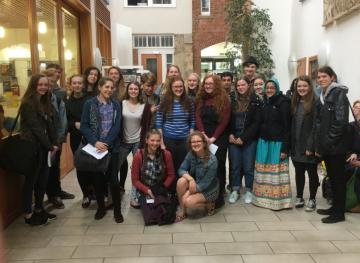Although there has been an increase in the provision of Latin in the state education sector in the UK, the majority of schools cannot offer it due to limited time and financial resources and a lack of trained staff. With only a couple of exceptions, this is unfortunately the case for most state schools in Oxfordshire and its surrounding areas. Therefore the Faculty of Classics at the University of Oxford decided to take on the role of providing Latin teaching for students attending the local schools that are in this situation, while also supporting initiatives at a national level to increase the number of Classics-trained staff and the support available for schools to encourage and embed the teaching of Classical subjects in the curriculum. The intention is that this dual approach will achieve both interim and sustainable long-term solutions to the supply and demand for Classics education in UK state schools.
Thanks to a generous grant from the Stonehouse Educational Foundation the Faculty is able to offer students in Years 9 and 10 (13–15 year olds) attending state schools in the Oxfordshire area that have no Latin provision free tuition in Latin language and literature ab initio through to GCSE. Lessons take place on Saturday mornings in the Faculty building and are taught by two professional Latin teachers, overseen and supported by the scheme co-ordinator (Dr Emma Searle). Essentially the scheme replicates the teaching that students would experience were they taking the subject as a GCSE option at school: lessons are scheduled during Oxfordshire schools’ term times, so it is possible to provide students with a routine and learning structure that is similar to that they experience at school, albeit more intensive; they are expected to consolidate their learning in class with appropriate study time at home each week, aided by internet learning tools. Homework is roughly the same as one would expect for any KS3 and then GCSE subject.

The first cohort (comprising 25 students from 15 schools across Oxfordshire, Berkshire, Buckinghamshire, and Northamptonshire) started in January 2015, and the last two and a half years have passed very quickly. The students have now sat their GCSE examinations after many months of intensive work. Despite the intensity of the work this cohort achieved stellar results, including 15 x A* and 4 x A.
Although the Latin teachers and the co-ordinator were sad to see the first cohort of students go, they do not have to say goodbye completely as Trinity College have very generously organised a curriculum enrichment programme in Classics and Classics-related subjects for students who have completed the OxLAT course. This ‘Advanced Programme in Classics and the Ancient World’ (organised by Dr Gail Trimble and Dr Peter Haarer) offers the OxLAT alumni the opportunity to extend their Latin language skills post-GCSE and encourage them to explore other areas of Classics and the Ancient World: literature, ancient history, archaeology, and beginners’ Ancient Greek.
Applications for the 2017-2019 cohort opened in March and again there was a very high level of interest – with applications from over 60 students across 10 schools in the Oxfordshire, Berkshire, and Buckinghamshire area. The co-ordinator and teachers involved were thoroughly impressed by the high level of enthusiasm and ability from all applicants, and competition was very, very strong, making it difficult for the selection panel to decide who should be offered a place on the Scheme. Lessons for this cohort (consisting of 25 students from 7 different schools in Oxfordshire, Berkshire, and Buckinghamshire) started in July with a bunch of fresh recruits.
The OxLat team look forward to being able to help schools introduce and embed Latin and Classical Civilisation into their timetable so that even more students have the opportunity to explore this diverse and inspiring subject area.
Emma Searle
DPhil Ancient History
OxLAT Teaching Scheme Co-Ordinator